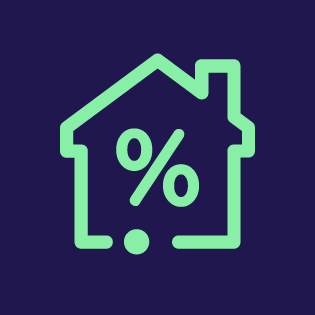Your read progress
How are mortgages calculated?
4 minute read
Updated 17th April 2024 | Published 23rd August 2023

Buying a home is likely to be the biggest financial commitment you’ll ever make. However, the wording that lenders use can be confusing. We’re here to help. In this blog, we explain how mortgages are calculated.
How do mortgage interest rates work?
Your interest rate is specific to the mortgage product or deal that you select. This usually lasts between two and five years but could be longer.
This might be a fixed rate (set in stone for an agreed length of time) or a variable rate (changeable with certain rules applied). Either way, it determines how much you are going to owe your lender every month.
When taking out a mortgage, you'll need to specify how long you want to take to repay the entire loan.This is called the mortgage term. A borrower will likely have several mortgage products or deals over the course of their entire mortgage term.
What is an APRC?
Mortgage lenders make their money in two ways. The first is from the interest they charge and the second is from additional application fees (sometimes also called product fees).
You can choose to pay these fees upfront or add them to your mortgage balance. If you add them to the mortgage balance you’ll pay interest on them as well as on the principal loan amount itself. Adding them to the mortgage balance is more expensive in the long term.
In the same way that interest rates can vary from lender to lender, so can the fees. Some lenders even have two very similar deals themselves – one with a lower rate and higher fees and the other vice versa.
For example, a mortgage lender might have a 5.79% interest rate deal with a £1,099 product fee. However, they may also have a fee-free version available at 5.49%.
Lenders must calculate a product's APRC (annual percentage rate of charge) to make it easier for borrowers to compare deals. It combines the interest rate and other fees into one percentage.
This figure can be useful but it’s worth noting that it assumes you’ll stay with the lender for the entire term. Few people do that. It also assumes that your rate won’t change which it probably will. And it assumes that when your deal comes to an end, you will move onto the lender’s SVR (standard variable rate) for the rest of the term, instead of shopping around for a new deal.
So it’s a good rule of thumb but not the only thing you should base your mortgage decision on.
How can you get a low interest rate?
Getting a good (low!) interest rate is the holy grail of buying a new home. There are various actions that borrowers can take to try and achieve this.
The first is to shop around. Many people choose to use a mortgage broker to help with this task.
The interest rate will also take into account your credit history. If you’ve had any debt problems, your credit score will show this. This may affect whether a lender wants to offer you a mortgage at a certain rate.
You can take steps to check and improve your credit score. It can also be helpful to show mortgage lenders that you are a responsible borrower. Having a good track record of making credit card payments on time for example, can be beneficial.
Lenders also evaluate the amount you wish to borrow in relation to the total value of the property. This evaluation is the Loan to Value. If your new home is worth £200k and you want to borrow £160,000, then your LTV is 80%. (The loan amount divided by the value of the property, multiplied by 100.) A lower LTV might lead lenders to offer you a lower interest rate because you pose less risk to them.
Other external factors influence the interest rate you might receive. This includes the Bank of England’s base rate and competition from other lenders.
Do mortgage payments decrease over time?
Unlike a credit card, your mortgage payments do not decrease as you pay off the loan.
A mortgage lender calculates a payment schedule that takes into account the principal and the interest owed. On a fixed rate mortgage, this won’t change until the end of the deal. On a variable rate mortgage, payments could go up or down but because of the type of mortgage you have chosen, not because of your remaining balance.
Each payment includes an element of capital as well as interest. To start with, mortgage repayments mainly cover the interest. And as time and payments progress, more of the capital is repaid. In the final years the repayments almost exclusively cover the principal loan.
Mortgage calculations depend on a number of factors. Some of these will be in your control and others will not. Always shop around and compare reviews of mortgage providers if you’re thinking of taking out a mortgage.
Written by Errolyn
Senior Content and Social Media Executive
As Featured By
Join our mission
We use the power of consumer reviews to help increase trust and transparency in financial services and to deliver industry leading insight and events.
Write a reviewExplore our other topics

News: Awards

News: Industry news

News: Smart Money People news

Blogs: Money choices



.png)